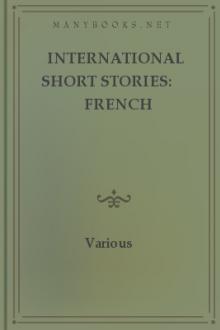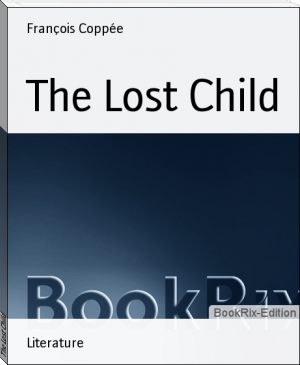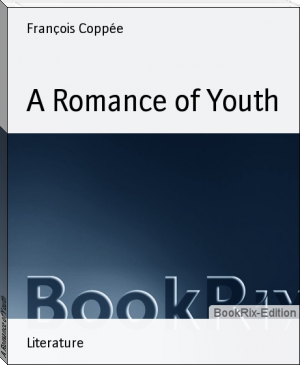International Short Stories: French - - (new books to read .TXT) 📗

- Author: -
- Performer: -
Book online «International Short Stories: French - - (new books to read .TXT) 📗». Author -
About this time of the year the mountaineers from Harberg, Kusnacht and the surrounding hamlets descend from their mountains about one o’clock in the morning and commence to mow the high grass in the valleys. One can hear their monotonous songs in the middle of the night keeping time to the circular movement of the scythes, the jingle of the cattle bells, and the young men’s and girls’ voices laughing afar in the silence of the night. It is a strange harmony, especially when the night is clear and there is a bright moon, and the heavy dew falling makes a pitter-patter on the leaves of the great forest trees.
Mr. Zacharias heard nothing of all this, for he was sleeping soundly; but the noise of a handful of peas being thrown against the window waked him suddenly. He listened and heard outside at the bottom of the wall, a “scit! scit!” so softly whispered that you might almost think it the cry of some bird. Nevertheless, the good man’s heart fluttered.
“What is that?” he cried.
After a few seconds’ silence a soft voice replied:
“Charlotte, Charlotte—it is I!”
Zacharias trembled; and as he listened with ears on the alert for each sound, the foliage on the trellis struck against the window and a figure climbed up quietly—oh so quietly—then stopped and stared into the room.
The old man being indignant at this, rose and opened the window, upon which the stranger climbed through noiselessly.
“Do not be frightened, Charlotte,” he said, “I have come to tell you some good news. My father will be here tomorrow.”
He received no response, for the reason that Zacharias was trying to light the lamp.
“Where are you, Charlotte?”
“Here I am,” cried the old man turning with a livid face and gazing fiercely at his rival.
The young man who stood before him was tall and slender, with large, frank, black eyes, brown cheeks, rosy lips, just covered with a little moustache, and a large brown, felt hat, tilted a little to one side.
The apparition of Zacharias stunned him to immovability. But as the Judge was about to cry out, he exclaimed:
“In the name of Heaven, do not call. I am no robber—I love Charlotte!”
“And—she—she?” stammered Zacharias.
“She loves me also! Oh, you need have no fear if you are one of her relations. We were betrothed at the Kusnacht feast. The fiancés of the Grinderwald and the Entilbach have the right to visit in the night. It is a custom of Unterwald. All the Swiss know that.”
“Yeri Foerster—Yeri, Charlotte’s father, never told me.”
“No, he does not know of our betrothal yet,” said the other, in a lower tone of voice; “when I asked his permission last year he told me to wait—that his daughter was too young yet—we were betrothed secretly. Only as I had not the Forester’s consent, I did not come in the night-time. This is the first time. I saw Charlotte in the town; but the time seemed so long to us both that I ended by confessing all to my father, and he has promised to see Yeri tomorrow. Ah, Monsieur, I knew it would give such pleasure to Charlotte that I could not help coming to announce my good news.”
The poor old man fell back in his chair and covered his face with his hands. Oh, how he suffered! What bitter thoughts passed through his brain; what a sad awakening after so many sweet and joyous dreams.
And the young mountaineer was not a whit more comfortable, as he stood leaning against a corner of the wall, his arms crossed over his breast, and the following thoughts running through his head:
“If old Foerster, who does not know of our betrothal, finds me here, he will kill me without listening to one word of explanation. That is certain.”
And he gazed anxiously at the door, his ear on the alert for the least sound.
A few moments afterward, Zacharias lifting his head, as though awakening from a dream, asked him:
“What is your name?”
“Karl Imnant, Monsieur.”
“What is your business?”
“My father hopes to obtain the position of a forester in the Grinderwald for me.”
There was a long silence and Zacharias looked at the young man with an envious eye.
“And she loves you?” he asked in a broken voice.
“Oh, yes, Monsieur; we love each other devotedly.”
And Zacharias, letting his eyes fall on his thin legs and his hands wrinkled and veined, murmured:
“Yes, she ought to love him; he is young and handsome.”
And his head fell on his breast again. All at once he arose, trembling in every limb, and opened the window.
“Young man, you have done very wrong; you will never know how much wrong you have really done. You must obtain Mr. Foerster’s consent—but go—go—you will hear from me soon.”
The young mountaineer did not wait for a second invitation; with one bound he jumped to the path below and disappeared behind the grand old trees.
“Poor, poor Zacharias,” the old Judge murmured, “all your illusions are fled.”
At seven o’clock, having regained his usual calmness of demeanor, he descended to the room below, where Charlotte, Dame Christine and Yeri were already waiting breakfast for him. The old man, turning his eyes from the young girl, advanced to the Head Forester, saying:
“My friend, I have a favor to ask of you. You know the son of the forester of the Grinderwald, do you not?”
“Karl Imnant, why yes, sir!”
“He is a worthy young man, and well behaved, I believe.”
“I think so, Monsieur.”
“Is he capable of succeeding his father?”
“Yes, he is twenty-one years old; he knows all about tree-clipping, which is the most necessary thing of all—he knows how to read and how to write; but that is not all; he must have influence.”
“Well, Master Yeri, I still have some influence in the Department of Forests and Rivers. This day fortnight, or three weeks at the latest, Karl Imnant shall be Assistant Forester of the Grinderwald, and I ask the hand of your daughter Charlotte for this brave young man.”
At this request, Charlotte, who had blushed and trembled with fear, uttered a cry and fell back into her mother’s arms.
Her father looking at her severely, said: “What is the matter, Charlotte? Do you refuse?”
“Oh, no, no, father—no!”
“That is as it should be! As for myself, I should never have refused any request of Mr. Zacharias Seiler’s! Come here and embrace your benefactor.”
Charlotte ran toward him and the old man pressed her to his heart, gazing long and earnestly at her, with eyes filled with tears. Then pleading business he started home, with only a crust of bread in his basket for breakfast.
Fifteen days afterward, Karl Imnant received the appointment of forester, taking his father’s place. Eight days later, he and Charlotte were married.
The guests drank the rich Rikevir wine, so highly esteemed by Yeri Foerster, and which seemed to him to have arrived so opportunely for the feast.
Mr. Zacharias Seiler was not present that day at the wedding, being ill at home. Since then he rarely goes fishing—and then, always to the Brünnen—toward the lake—on the other side of the mountain.
ZADIG THE BABYLONIAN By Francois Marie Arouet De Voltaire THE BLIND OF ONE EYE
There lived at Babylon, in the reign of King Moabdar, a young man named Zadig, of a good natural disposition, strengthened and improved by education. Though rich and young, he had learned to moderate his passions; he had nothing stiff or affected in his behavior, he did not pretend to examine every action by the strict rules of reason, but was always ready to make proper allowances for the weakness of mankind.
It was matter of surprise that, notwithstanding his sprightly wit, he never exposed by his raillery those vague, incoherent, and noisy discourses, those rash censures, ignorant decisions, coarse jests, and all that empty jingle of words which at Babylon went by the name of conversation. He had learned, in the first book of Zoroaster, that self love is a football swelled with wind, from which, when pierced, the most terrible tempests issue forth.
Above all, Zadig never boasted of his conquests among the women, nor affected to entertain a contemptible opinion of the fair sex. He was generous, and was never afraid of obliging the ungrateful; remembering the grand precept of Zoroaster, “When thou eatest, give to the dogs, should they even bite thee.” He was as wise as it is possible for man to be, for he sought to live with the wise.
Instructed in the sciences of the ancient Chaldeans, he understood the principles of natural philosophy, such as they were then supposed to be; and knew as much of metaphysics as hath ever been known in any age, that is, little or nothing at all. He was firmly persuaded, notwithstanding the new philosophy of the times, that the year consisted of three hundred and sixty-five days and six hours, and that the sun was in the center of the world. But when the principal magi told him, with a haughty and contemptuous air, that his sentiments were of a dangerous tendency, and that it was to be an enemy to the state to believe that the sun revolved round its own axis, and that the year had twelve months, he held his tongue with great modesty and meekness.
Possessed as he was of great riches, and consequently of many friends, blessed with a good constitution, a handsome figure, a mind just and moderate, and a heart noble and sincere, he fondly imagined that he might easily be happy. He was going to be married to Semira, who, in point of beauty, birth, and fortune, was the first match in Babylon. He had a real and virtuous affection for this lady, and she loved him with the most passionate fondness.
The happy moment was almost arrived that was to unite them forever in the bands of wedlock, when happening to take a walk together toward one of the gates of Babylon, under the palm trees that adorn the banks of the Euphrates, they saw some men approaching, armed with sabers and arrows. These were the attendants of young Orcan, the minister’s nephew, whom his uncle’s creatures had flattered into an opinion that he might do everything with impunity. He had none of the graces nor virtues of Zadig; but thinking himself a much more accomplished man, he was enraged to find that the other was preferred before him. This jealousy, which was merely the effect of his vanity, made him imagine that he was desperately in love with Semira; and accordingly he resolved to carry her off. The ravishers seized her; in the violence of the outrage they wounded her, and made the blood flow from her person, the sight of which would have softened the tigers of Mount Imaus. She pierced the heavens with her complaints. She cried out, “My dear husband! they tear me from the man I adore.” Regardless of her own danger, she was only concerned for the fate of her dear Zadig, who, in the meantime, defended himself with all the strength that courage and love could inspire. Assisted only by two slaves, he put the ravishers to flight and carried home Semira, insensible and bloody as she was.
On opening her eyes and beholding her deliverer. “O Zadig!” said she, “I loved thee formerly as my intended husband; I now love thee as the preserver of my honor and my life.” Never was heart more deeply affected than that of Semira. Never did a more charming mouth express more moving sentiments, in those glowing words inspired by a sense of the greatest of all favors, and by the most tender transports of a lawful passion.
Her wound was slight and was soon cured. Zadig was more dangerously wounded; an arrow had pierced him near his eye, and penetrated to a considerable depth.





Comments (0)